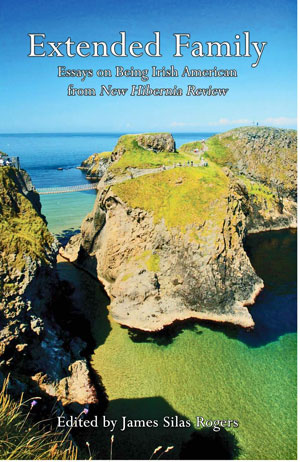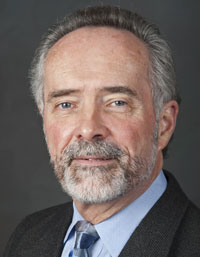A book-launch reception to celebrate the publication of Extended Family: Essays on Being Irish American will be held at noon Monday, March 11, in the O’Shaughnessy Room (108) of the O’Shaughnessy-Frey Library Center on the St. Paul campus of the University of St. Thomas.
The reception is free and open to all. Refreshments will be served, and copies of the new book will be available for purchase and signing.

James Silas Rogers.
Edited by James Silas Rogers, the book brings together 11 personal essays, three annotated articles and a long poem that originally appeared in New Hibernia Review, a quarterly journal published since 1996 by St. Thomas’ Center for Irish Studies.
Rogers, a St. Paul resident who served as president of the American Conference for Irish Studies from 2009 to 2011, is director of the center and has edited New Hibernia Review since 2005. The first copy of the journal was presented to Ireland’s president, Michael D. Higgins, when he was the country’s minister of arts.
“This collection came into existence when, at a certain point, I realized that New Hibernia Review has accumulated a striking body of work, grounded in the lived experience of Irish and American writers, that drew close to the question: What does it mean to be an Irish American?” Rogers said.
A tradition of New Hibernia Review is to open each issue with a memoir or first-person essay. Rogers selected 11 of them for Extended Family. Of those, four have been recognized as “Notable Essays of the Year” in Houghton Mifflin’s annual Best American Essays edited by author and New York Times columnist David Brooks.
An example is “Stories From Down Cellar,” an essay by former St. Thomas English professor Brian Nerney, now chair of the Communication, Writing and Arts Department at Metropolitan State University.
As Rogers writes in his introduction, Nerney’s essay “overturns an enforced silence. Working backward from a short, one-off conversation with his father, Nerney uncovers the specifics of a family tale concerning his grandmother, the daughter of immigrants, who had witnessed a murder and testified at the trial.
“In a sense, keeping the secret came to define the family experience: We get the feeling that Nerney needs to know the story in order to fully understand the family experience, but also that he has somehow violated a trust by telling the truth.
“Nerney’s inclination to reveal the truth collides with the earlier generations’ insistence on keeping secrets. From the beginning, he knows instinctively that Irishness was a key to understanding the full dimensions of the family’s reticence. But what he understood Irishness to mean differed from his forbears’ understanding; the obsession with respectability that dominated the generations before him no longer makes sense.”
 Extended Family opens with “The Narrows,” a long poem by Daniel Tobin. The poem “sets out many of the themes that percolate through the book,” Rogers wrote. “Loss is here, but so is the expansive sense of belonging to a great historical narrative.”
Extended Family opens with “The Narrows,” a long poem by Daniel Tobin. The poem “sets out many of the themes that percolate through the book,” Rogers wrote. “Loss is here, but so is the expansive sense of belonging to a great historical narrative.”
Other essays delve into the concept of Ireland as “a source country”; a father’s one and only trip back to his native Ireland; the Midwestern town of O’Neill, “the Irish Capital of Nebraska”; marriages of Irish to American Indians; the 1944 film “Going My Way”; life on Prince Edward Island; Emily Dickinson; the novel Moon Gaffney; a small eighth-century Irish artwork, Emly Shrine; a trip to the Black Hills; and the oak trees of Ireland and California.
Rogers observes that “pretty much everything ever written about Irish identity in America has concluded that it rests on Catholicism, attachment to urban neighborhoods, the Democratic Party and a passion for the national struggle back in Ireland.
“One of the things that is remarkable about the work in Extended Family is that those elements are almost nowhere to be seen. And yet all of the authors have an abiding sense of their own Irishness – not just the fact that they are Irish by descent, but that their Irishness is key to who they are – the Rosetta Stone that will explain everything.”
For more information about the new book, contact Rogers at (651) 962-5662 or jrogers@stthomas.edu.







